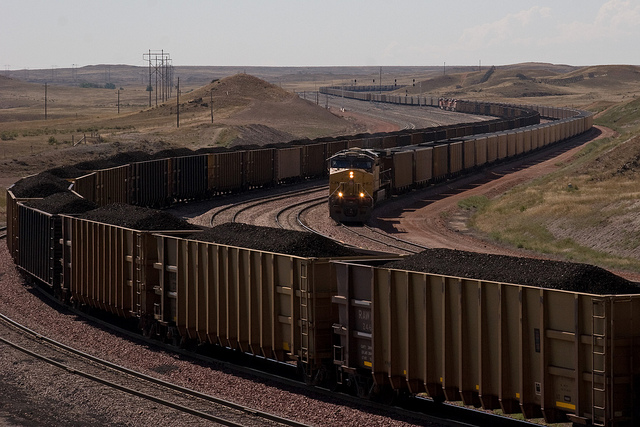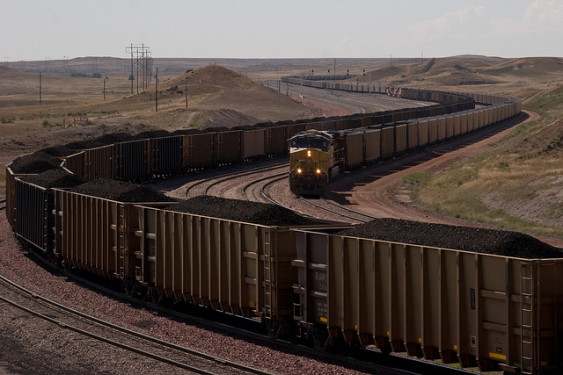Powder River Basin coal mining firm Cloud Peak suffered through a stock sell-off today after the company announced that it would be shipping a bit less coal this year than it had expected to. Previously, the company had said that it would sell between 85 and 89 million tons through the end of the year. But because of poor performance by rail companies—particularly BNSF, which has clogged its rail lines with dangerous oil trains—Cloud Peak can only hope to deliver between 83 and 86 million tons in 2014.
Cloud Peak’s announcement sent investors heading for the exits, with the company’s stock price declining by 8 percent in an hour. To me, that seemed like an outsized reaction, given that the problems with BNSF rail congestion were well understood, and would cut Cloud Peak’s annual production by only about 3 percent.
But the quick downturn shows just how little it takes these days to shake investors’ confidence in the coal industry.
The market’s out-sized reaction to today’s news also gives perspective to the major export announcements over the past month—including the freeing up of terminal space at Westshore for Cloud Peak coal, the Port of Metro Vancouver’s approval of the Fraser Surrey Docks coal export terminal, and the Oregon Department of State Lands’ denial of the Morrow Pacific coal export project. None of that news, whether positive or negative, had any discernible impact on Cloud Peak stock, either in its price or its trading volume.
The market’s blasé attitude towards the most significant coal export news in years may signal something rather disappointing for Cloud Peak’s export ambitions: namely, that investors are already discounting the likelihood that the company will make significant profits selling coal to Asia.
Perhaps investors are right to discount the importance of coal exports. According to Cloud Peak’s financials, the company has now lost money selling coal overseas for four consecutive quarters. (Cloud Peak has continued to earn money from the “hedges” it made in previous years, betting that the price of coal would fall.) The losses accelerated last quarter, with Cloud Peak’s export arm losing about $4.80 per ton. When prodded by a clever Wall St. analyst about why the company doesn’t halt money-losing exports of its Spring Creek coal, and simply sell its coal domestically, Cloud Peak’s CEO responded:
Colin Marshall – President & CEO: I don’t think that would make much sense quite frankly because…there’s a finite market for Spring Creek coal domestically. So we would not obviously be able to sell it. And there are also a take or pay commitments with the rail and the [port], so that wouldn’t actually be an option.
The simple translation of CEO-speak: Cloud Peak is exporting coal today only because it can’t get out of its costly contracts with rail and port companies—contracts that are forcing the company to continue producing and exporting coal at a loss.
So the fact that the market barely hiccupped in the face of major export news (both positive and negative), but took a huge tumble after today’s unsurprising announcement about soft domestic sells, suggests that the market as a whole really doesn’t give a hoot about Cloud Peak’s export strategy. For the US coal industry, exports have now reverted to what they were before the Pacific Rim coal bubble began to inflate—a distraction from the core challenge of selling coal in an era of declining domestic demand.










Michael Riordan
Again, a good analysis, Clark. Still it puzzles me that CLD is buying up export capacity at Westshore when it’s losing $4.80 per ton doing so. Must be hoping for a price rise.
Clark Williams-Derry
I agree, it is a puzzle. I assume that they’re gambling that coal prices are unnaturally low right now, and that sooner or later they’ll rise to the point that they can at least break even. Who knows, they could be right! If prices do rise, they’ll feel lucky that they bought extra port capacity at the bottom of the market…and if prices don’t rise, they’re screwed anyway.
What I think today’s stock sell-off shows is that CLD can’t afford to reduce output expectations, or the market will absolutely pummel it. CLD has already admitted that Spring Creek coal has a limited domestic market; if they can’t sell it overseas, they can’t sell it, period. So I think they’re correctly worried that if they abandoned their export strategy, and instead announced cutbacks at Spring Creek — on top of the cutbacks they’ve already announced at Cordero Rojo — their stock prices would fall even further.